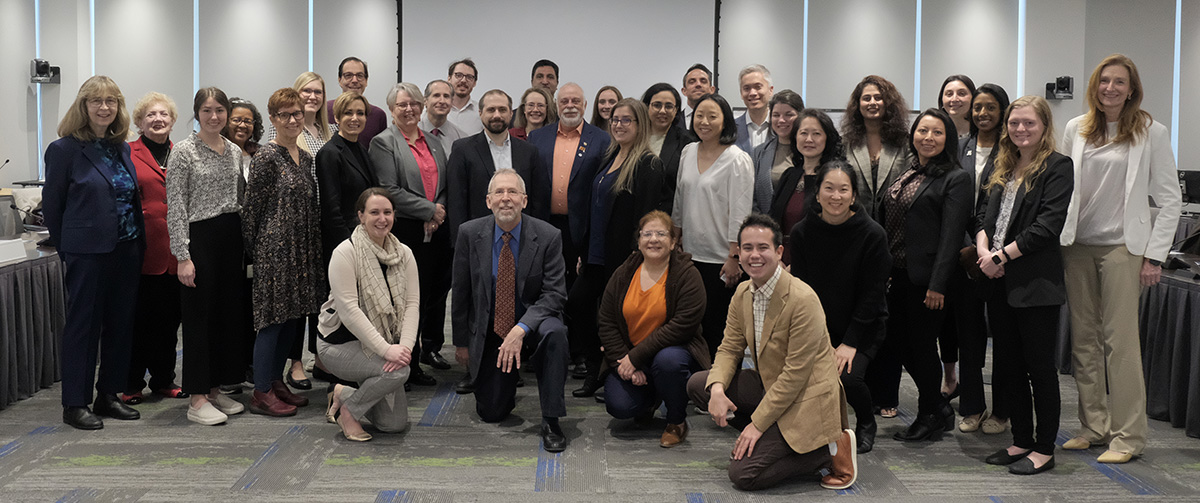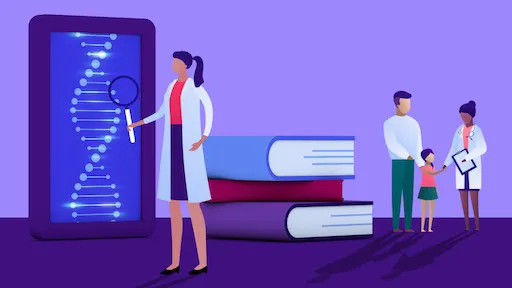The Inter-Society Coordinating Committee for Practitioner Education in Genomics (ISCC-PEG) aims to improve genomic literacy of healthcare providers and enhance the effective practice of genomics-informed healthcare by facilitating interactions among the key stakeholders in genomics education.
PowerPoint Downloads

- ISCC-PEG Information PPT Slide (For use in member presentations)
- ISCC-PEG Template
ISCC-PEG Co-Chairs

- Provider Education Specialist
- Education and Community Involvement Branch

- Associate Dean for Academic Affairs and Professor
- Duquesne University School of Nursing
Project Groups
The Inter-Society Coordinating Committee for Practitioner Education in Genomics (ISCC-PEG) commissioned four initial working groups to address major areas identified at the Genomic Medicine IV meeting that are critical to effective implementation of clinical genomics. Over time, additional project groups have been established. Project groups are proposed by and made up of ISCC-PEG members. These groups play a key role in addressing specific needs in genomics education and developing related resources.
Project Groups have developed resources, presentations for national meetings, and published articles and abstracts (for full list see “ISCC-PEG Accomplishments: 2020-2023”).
Examples of resources developed include:
- Universal Genomics Education Exercises
- Clinical Decision-Making in the Prenatal Setting
- Direct-to-Consumer Genetic Testing FAQ for Healthcare Professionals
- Nursing Genomics Frequently Asked Questions (FAQ)
Inclusion in the Practice of Genomic Medicine: Exploring the Impact of Implicit Biases Towards Disability
Co-Chairs: Shoumita Dasgupta and Maya Sabatello
This group has developed CME/CEU-granting educational resources related to studying unconscious bias for individuals with disabilities during prenatal screening.
This Project Group's goals are to:
- Identify implicit and/or explicit bias held by medical students and clinicians towards individuals with physical and/or intellectual disability.
- Determine whether these biases impact genetic counseling recommendations in a prenatal setting.
- Assess whether training in patient-centered counseling can positively impact subjects' ability to appropriately make unbiased prenatal recommendations.
Pharmacogenomics (PGx)
Co-Chairs: Phil Empey and Roseann S. Donnelly (Gammal)
This project group develops educational content for clinicians of all specialties. This is a multidisciplinary group that leverages expertise from nurses, PharmDs, physicians, researchers, and others with expertise in pharmacogenomics.
This Project Group is working on these goals:
- Create and/or re-purpose pharmacogenomics educational content and resources targeted to clinicians;
- Prepare for presentations at clinician professional meetings;
- Tailored pharmacogenomics educational content for nurses, pharmacists, physician assistants, genetic counselors, physicians, researchers, and other healthcare professionals; and
Educate the public in pharmacogenomics to improve healthcare.
Seeking New Members
Pharmacogenomics Learning SeriesDirect-to-Consumer Genetic Testing (DTC-GT)
Co-Chairs: Tracey Weiler and Houriya Ayoubieh
This project group creates educational information for primary care practitioners and other professionals to learn ways to integrate DTC-GT into clinical practice.
This Project Group is working on the following goals:
- Assessing need, generating ideas and facilitating development for additional DTC-GT educational resources for healthcare professionals and trainees.
- Identifying venues to partner with to develop and and distribute DTC-GT educational resources appropriate to the needs of organizations needing DTC-GT education (ISCC member organizations and others).
- Collecting and documenting existing DTC-GT information resources (including educational, position statements and peer-reviewed literature and news media)
Seeking New Members
DTC-GT FAQRare Diseases
Co-Chairs: Sabrina Malone Jenkins and Wesley Patterson
Project Group Goals:
- Educate healthcare professionals on available resources for rare genetic diseases.
- Develop resources to address the challenges of rare diseases, such as diagnostic delays, lack of available treatment guidelines, and limited referral pathways.
- Identify effective dissemination methods for information about rare diseases by specialty or practice area.
Seeking New Members
OB/GYN Genetics Curriculum
Co-Chairs: Barbara O’Brien and Louise Wilkins-Haug
Project Group Description:
We aim to develop a national Obstetrics and Gynecology (OB/GYN) genetics/genomics curriculum. Our initial focus is on residents, but we hope the resources will be applicable to other healthcare providers involved in caring for OB/GYN patients.
Project Group Goals:
- Using a modified Delphi approach with the project group members and other experts, develop curricular learning objectives.
- Develop a curriculum and teaching tools for implementation.
- Disseminate and evaluate the curriculum at OB/GYN residency programs.
- Adapt the curriculum to other OB/GYN healthcare providers.
Seeking New Members
Adult Cardiovascular Genomics
Co-Chairs: Siddharth Prakash and Bansari Rajani
Project Group Goals:
- Fulfill an unmet need for adult cardiovascular genetics education for a global audience
- Increase awareness of heritable cardiovascular diseases by non-specialist health professionals, who are gatekeepers and partners in the diagnosis and treatment of these patients
- Improve the recognition and referral of patients with genetically triggered cardiovascular diseases
- Increase the diversity of faculty perspectives by featuring case-based modules that address genomic issues that are relevant to daily clinical cardiovascular practice
Seeking New Members.
UTHealth Adult Cardiovascular Genomics Certificate ProgramNursing Genomics
Co-Chairs: Trina Walker and Anne Ersig
Overall Mission: This project group aims to support the integration of genetics and genomics into nursing education and practice at all levels.
Project Group Goals:
- Define the role of the nurse in genetics and genomics
- Obtain support of nursing leaders to ensure continued emphasis of genetics and genomics in routine nursing education and practice
- Assemble available comprehensive and accessible working resources for nursing faculty, practicing nurses, and advanced practice clinicians
Project Group Proposal:
- ISCC PEG: Nursing Genomics Project Group (PDF)
Presented at the ISCC-PEG Plenary Call on November 3, 2021
Seeking New Members
Nursing Genomics FAQLast updated: February 27, 2025




